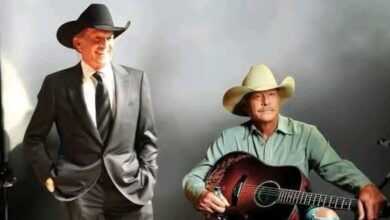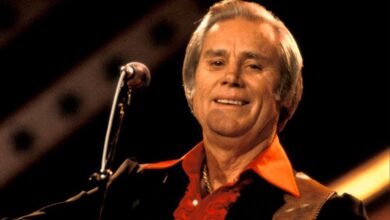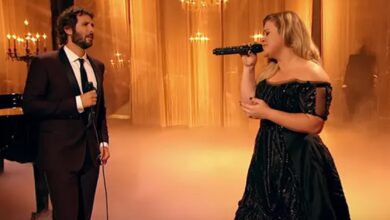The Righteous Brothers’ “You’ll Never Walk Alone” Echoes Through Generations With Soulful Brilliance in 1965
When The Righteous Brothers released their version of “You’ll Never Walk Alone” in 1965, they did more than revive a Broadway classic — they redefined it. Originally composed by Rodgers and Hammerstein for the 1945 musical Carousel, the song had been a symbol of hope and perseverance. But in the hands of Bill Medley and Bobby Hatfield, it took on a raw emotional depth that connected with a wide pop audience, especially after their powerful live rendition on national television. Their performance helped bring a theater standard into the mainstream pop and soul lexicon, making it unforgettable for generations.
The Righteous Brothers, Bill Medley and Bobby Hatfield, had already made a name for themselves as one of the most emotionally potent duos in popular music. Emerging from California in the early ’60s, they brought a unique blend of deep baritone and soaring tenor vocals that would later define what critics dubbed “blue-eyed soul.” Their ability to blend the gritty intensity of rhythm and blues with the melodic sensibilities of pop made them stand out in a crowded music scene, dominated at the time by British Invasion acts and Motown stars.
The decision to cover “You’ll Never Walk Alone” was not one of trend-chasing, but of personal and artistic intent. The song’s message — enduring hardship with strength and dignity — resonated deeply with both singers. The duo had often spoken about the emotional honesty in their music, and this track, with its rich legacy and universal theme, offered them the perfect vessel for that sincerity. Choosing it for their Just Once in My Life album was a way of honoring their influences while stretching the emotional boundaries of popular music.
The production of the song was deliberately stripped down to let their voices shine. With Medley taking the lower registers and Hatfield soaring into the climactic high notes, the arrangement emphasized contrast and drama. The instrumentation was restrained — a quiet piano introduction, subtle string accents, and gradually building percussion that swelled into an almost gospel-like crescendo. Their voices didn’t just harmonize; they collided and rose with intention, turning the performance into a soul-baring confession.
Upon its release, the song received positive acclaim, particularly after the duo performed it on The Ed Sullivan Show later that year. While it didn’t chart as high as some of their other hits, its emotional impact was undeniable. Audiences were visibly moved by the televised performance, and it gave new life to a song that was, by then, two decades old. Critics praised their vocal control and the sheer vulnerability of their delivery.
The performance’s cultural weight was immediately felt. “You’ll Never Walk Alone” had long been a song of solidarity and sorrow, adopted by football fans, civil rights movements, and grieving communities alike. But The Righteous Brothers managed to translate it into the language of American pop soul without losing a shred of its original dignity. They didn’t just sing the song — they embodied it. In doing so, they helped shift the perception of what pop music could be.
For The Righteous Brothers, the song marked another turning point in an already soaring career. Following chart-toppers like “You’ve Lost That Lovin’ Feelin’” and “Unchained Melody,” this track allowed them to show a quieter, more reverent side. It wasn’t about commercial dominance this time — it was about legacy, expression, and depth. It cemented their reputation as not just hitmakers but interpreters of deep emotional truths.
The impact of their rendition would ripple outward into other genres. Gospel artists began to reimagine the song with more vocal firepower, while pop singers saw its potential as a vehicle for personal expression. It set a standard: any future performance of “You’ll Never Walk Alone” would inevitably be compared to the haunting, slow-burning power of The Righteous Brothers’ version.
In the decades that followed, the song would be covered by a wide range of artists — Elvis Presley, Aretha Franklin, Barbra Streisand — each bringing their own sensibilities to it. But few could match the emotional equilibrium that Medley and Hatfield achieved: the balance of strength and sorrow, of hope and heartache. It was this balance that made their version enduring.
At the time of the song’s release, the duo were also navigating major changes in their personal and professional lives. Touring demands were grueling, and the mid-1960s music industry was rapidly shifting. Still, songs like “You’ll Never Walk Alone” offered them artistic grounding. It was a reminder of their roots in gospel and R&B, even as the world around them changed.
Over the years, The Righteous Brothers’ rendition has remained a staple on oldies radio, in memorial tributes, and in retrospectives about classic American pop. Its influence persists not because of chart statistics, but because of its emotional resonance. Few songs from that era continue to speak with such clarity and force.
Their interpretation also paved the way for a more narrative-driven approach in pop performance. It showed that vulnerability could be powerful, that stripped-down arrangements could rival the most elaborate productions. This philosophy would later be echoed in the work of artists like Adele, Michael Bolton, and Josh Groban, whose styles owe much to the trail The Righteous Brothers blazed.
Though neither Bill Medley nor Bobby Hatfield could have predicted the long legacy of their performance, the public response made it clear: this was no ordinary cover. It was a touchstone moment — a perfect convergence of song, voice, and cultural timing. Even today, when the performance resurfaces online or in tribute, it evokes tears and reflection.
Bobby Hatfield passed away in 2003, but his soaring tenor on this track lives on. Posthumous tributes to the duo often include their version of “You’ll Never Walk Alone” as a symbol of perseverance, unity, and soul. It serves as both a memorial and a beacon — a testament to what two voices can achieve when driven by heart.
Ultimately, the reason this rendition endures is simple: it speaks to something human and eternal. “You’ll Never Walk Alone” is not just a song — it’s a promise. And through The Righteous Brothers, that promise was delivered with such aching beauty that it still echoes, clear and strong, all these years later.



